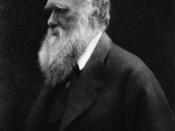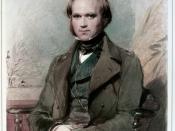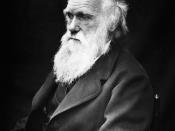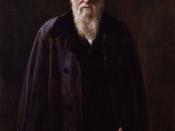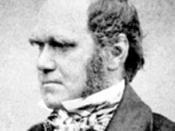Many of the theories and ideas that are still influencing people today are the brainchilds of Carlous Linnaeus and Charles Robert Darwin. Two men who lived in the 18th and 19th centuries. They both contributed a great deal to taxonomy. Linnaeus, by writing a classification system of plants and animals and developing a two name Latin system of distinguishing organisms from each other. Darwin, by developing on the theory of evolution. They also have written many books and publications.
Carlous Linnaeus was born May 13, 1707 in a rural part of Smaland, Sweden. His family wasn't particularly wealthy and he was the oldest of five children. Linnaeus's father, Nils was a minister but kept a large garden and enjoyed plants. He often brought young Carlous out to it and gave him flowers to examine and play with. This is what fostered his son's interest in botany (Prance 1999).
Linnaeus deeply enjoyed nature and decided to study it in college.
He began his education at the University of Lund to study medicine, mainly because it included materia medica, or botany study. The next year he transferred to Uppsaka, which had a stronger botany department.
In 1735 his first work was published, it was called Systema Naturae. The subject was a new classification arrangement of mineral, plant and animal kingdoms. Among it he wrote about a sexual system for classification of different types of plants (Benson 1995). However not everyone was happy with this new system. Two men who were members of the Society of Apothecaries Garden at Chelsea disagreed but were soon won over with Linnaeus's extensive knowledge of botany.
Linneaus's Philosophia botanica is his most widely known work. In it he claimed that plants do sexually reproduce and named all the flowering parts of the plants (Blunt, 1971).
Linnaeus's binomial system is still used today. It is the process of naming all plants and animals with standard two-word Latin names. The first word would be the name of the genus and the second would be the species, usually describing a particular trait. Before Linneaus's developed this system, many organisms where given names as long as 15 words and that caused great confusion. Both these names would be Latin, to eliminate confusion between scientists that speak different languages. International Codes which regulates the scientific names for all organisms, considers Linnaeus one of the first taxonomists (Johnson, 1994).
Linnaeus died January 10, 1778 at age 70 from a ulcerated bladder. His contributions to taxonomy are still widely known today. (Prance 1999).
Another great contributor to natural science was Charles Darwin, born February 12, 1809 in Shewsbury England. Unlike Linnaeus he was born into a very successful English family. (Bird, 1995) Darwin was the fifth child of six. (Brent, 1981).
Darwin did not take immediately to his future profession as though Linnaeus had. He went to the University of Cambridge to study medicine and dropped out. Darwin then determined to further his education by studying to become as clergyman for the Church of England at Cambridge University. After he graduated he was offered to take a trip on the HMS Beagle as a unpaid naturalist. Darwin's job on the ship was to take note of geological formations, along with this came the chance to observe many living organisms (Bird, 1995). This is when Darwin started to see connections between distinct but similar species.
Despite writing many other books, Darwin's most famous and well know work is "The Origin of Species" (1859). In this book Darwin explained the theory of natural selection and survival of the fittest , those are the ones that are able to carry on their genetics to the next generation. In the Origin of Species he also introduced the idea of evolution. (Phillips, 1971).
This theory did not go over well though. Many scientist disagreed strongly and argued that he could not prove his theory. However either side could not be proved wrong or right until Mendel's hereditary experiments where done in the early 20th century. Darwin's opponents were not all scientists, many religious people refused to accept the theory, believing that all life came directly from God and evolution simply did not happen. This debate is still continuing today.
Darwin died on April 19, 1882 at his home of Chargans disease, probably picked up from his travels. (Brent, 1981) Carlous Linnaeus's and Charles Darwin greatly influenced and changed the fields of botany, naturalism and evolution of their time and continue to do so today. These two men will not be forgotten and their work will continue on.
